About Star Explorers
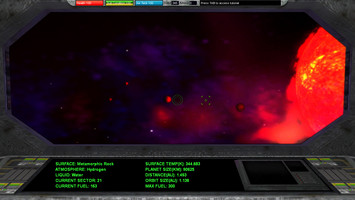
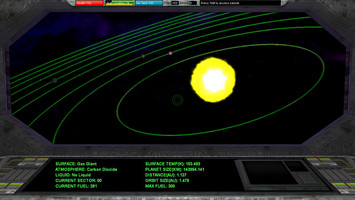
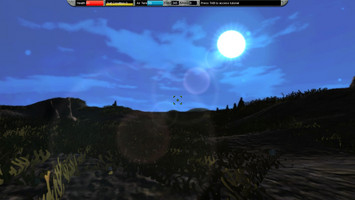
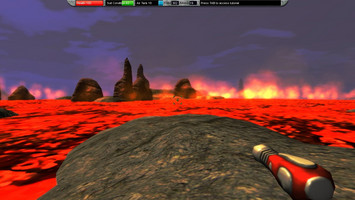

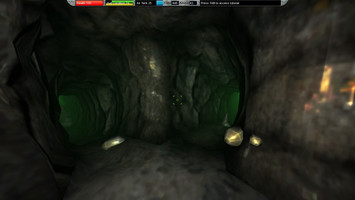
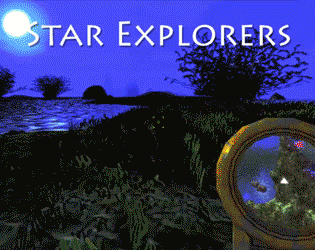
In October of 2013, I came up with the idea for a game. The idea had, at it's core, the essential features of the now well known game No Man's Sky. It would generate a galaxy, with different stars, planets and other worlds. It would allow the player to explore this galaxy, land on the planets, explore caves, ancient ruins and alien cities. Planets would be randomly generated at the time of landing, but would remain persistent, so the player could come and go to each planet as many times as he wanted. The player could find items and upgrades for his space suit, which would allow him to survive and land on more volatile planets, being too hot, too cold or with other various surface hazards prior to the upgrade.
The idea came mainly as a result of playing a lot of Minecraft, with it's randomly generated terrains, and watching every episode of Star Trek on Netflix in a short period of time. Also, having seen programs like Celestia and Space Engine, which allowed a player to explore a galaxy (but did not allow them to land on and interact with the planets) the concept suddenly seemed feasible to make a galaxy that spawned random planets, with random terrains and other features.
I started working on my game, I called it Star Explorers. I didn't tell anyone about it. I mostly kept it a secret because I thought the idea was so unique that if anyone heard about it, they might snatch it up and make the game themselves. I did tell some close family members, however, and I showed them some early prototypes of the game.
I started working on the game in an engine called Unity. Here is a screen capture of that original version that I later abandoned.
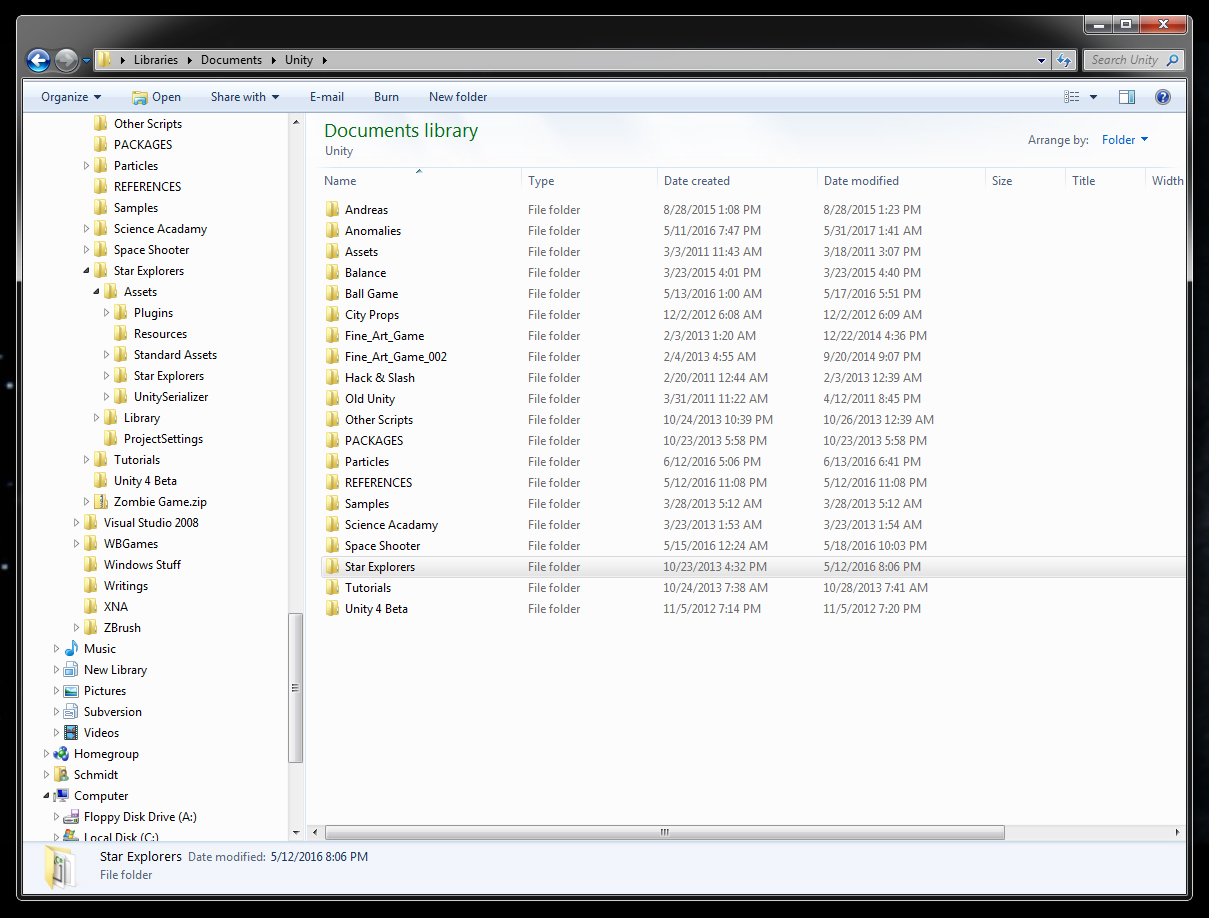
I turned to a different game engine: 3D Game Studio. I was much more familiar with 3D Game Studio, but I knew it would be a sacrifice because 3D Game Studio only makes games for Windows. However, making a game for Windows that works is better than making a game for many platforms that doesn't work. This is not to imply that Unity is somehow deficient in any way, but my knowledge of C# was far less that my knowledge of Atari's Lite-C language, used by 3D Game Studio.
Production continued for about a year. Then my brother hit me with a bombshell. The No Man's Sky trailer. Yes, that trailer had come out in December of 2013 or so, but I had not heard of it. Here is the text message my brother sent me, and my response.
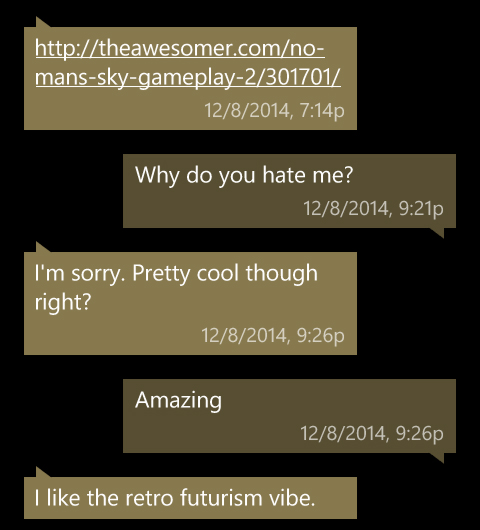
Here's a text he's sent me earlier. It was for Space Engine, a game I'd tried already. Notice my response, how it demonstrates I am still convinced that my game idea is unique.
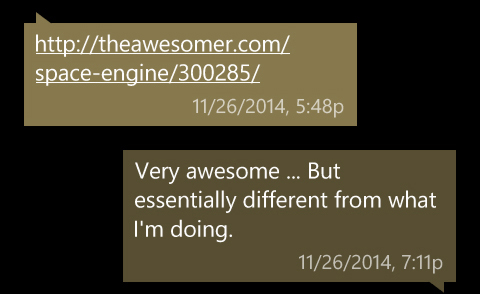
The cat was out of the bag. My game idea was not unique. No Man's Sky was already looking way, way better than my game. They had a team of developers. They had a big name publisher helping them out. They were going to beat me to it, and my little indie game would fall into obscurity. Check it out if you haven't seen it yet, the original link is still active...
What did I do? I thought about quitting. I thought, hey maybe I'll just buy No Man's Sky and play that instead of working on my game. That may have been the smart thing to do. Did I do that? No, of course not. I persisted. I said to myself, they might fail. They might not be able to figure out how to make all those ideas work and then who would come in and fill the vacuum they left? Also, even if they do make their game, which looked amazing, maybe it wouldn't be good. Maybe the gameplay would be terrible. Or, perhaps, maybe little old me, working alone, might come up with a unique approach, and make something less sophisticated, but nevertheless more fun.
I decided to continue working on Star Explorers. Whether you agree with that decision or not, whether it was the right thing to do, is not relevant anymore. Seeing that the idea itself was no longer a secret, I started telling people about it, and started showing my progress online. I even entered National Geographic's Expedition Granted contest, describing Star Explorers as a virtual expedition to the stars. I didn't win, but here's the video I used in the pitch:
No surprise that it didn't win. It looked terrible. It looked like I had no idea what I was doing. It was not the smooth, beautiful graphics people expect to see in a game trailer. It was, as we in the indie game world like to say “placeholder graphics.” I was struggling to figure out how the game would work. I was working alone. I did not have time to make it look good, that would have been self indulgent, right? I was following the approved method of game design, which is to get the game mechanics working, and then, and only then, giving it all the finishing touches, like cool graphics, sound effects etc...
So I continued. I enjoyed working on Star Explorers. It was fun, it was challenging. Sometimes I wanted to pull my hair out. Sometimes I wanted to cry. But all the hurdles I faced were surmountable. All the difficulties were ultimately overcome.
In August of 2016, No Man's Sky was released. Again, I went through the process of figuring out whether it was worth it to continue working on my game. Then the reviews started coming in. Bad … terrible … liars! To many people, No Man's sky was a wreck. False advertising … outright lies … the game didn't do what it promised. My hopes were rekindled. Maybe my little project would be received with open arms by those people who were let down by No Man's Sky.
I looked at the list of complaints though. “Multiplayer doesn't work” – my game was single player; “You can't fly your ship over the planet's terrain like they showed in the trailer” – my game doesn't let you do that either, in fact my game uses (gasp!) loading screens when landing and taking off from a planet; “The graphics are worse than what they showed in the trailer” – well, my game's graphics were worse than the No Man's Sky trailer too.
Even with its flaws, No Man's Sky was a bigger, better and obviously way more popular game.
So what's the purpose of all this? Am I trying to prove that Hello Games stole the idea from me? Or that I should somehow be credited with creating their game? No. No I'm not.
The purpose is to tell my story, and to perhaps help others to learn the lessons I learned. First, a game idea is just an idea until you make it real. As such, the first person to put the idea out there, along with the ability to show it, will be given the credit for it. Was No Man's sky a working game at the time they put out their first trailer? I have no idea, but the trailer looked great and it conveyed the concept. People accepted that it would do what they said it would do, and that created excitement, and also linked that concept with their game and their company. My big take away is that I should have talked about my game right away. If the idea caught on, who knows … maybe some big publishing company would have helped me make it. Stranger things have happened, right?
I didn't do that though. I hid my idea, guarding it jealously. I would not have said anything about it until it was done. Then I would have revealed it to the world and … probably nothing would have happened. Without sharing your idea, telling people about it, it seems you can't build up any excitement. When it comes out, if there is no excitement, it will take a long time to create some.
I soon learned about a thing called “Simultaneous Invention.” It has happened throughout history. People from different parts of the world, in different situations, will occasionally come up with exactly the same discovery or invention. I didn't know about this at the time, but I'm quite familiar with the concept now. Ideas by themselves are not unique. Many people have ideas. It is the ones who act on those ideas, who talk about them, who implement them, that make the difference.
In fact, as it turns out the whole concept of my game, and No Man's Sky was not unique. In 2001 a game called Noctis allowed a player to travel to a huge number of distant stars, to land on planets and explore their unique surfaces. It did not include many features like inventory or any kind of combat, but the basic building blocks were there.
This was another blow to my ego, as I found out about Noctis after I actually released Star Explorers on Steam (in Early Access) in May of 2017 - and was fully released one year later (as promised) on May 8th 2018. Here's the current trailer:
Of course there were the doubters, “Hey isn't this just like No Man's Sky?” “Well, actually ...” I would respond, but I don't know if anyone believed me. Not everyone has heard of Simultaneous Invention. Not everyone saw me working and struggling to make my game all those years. That's why I'm writing this. I felt I had to lay down the facts as they were … to set the record straight as I experienced it.
Actually I'm quite happy about my game and its progress. It's not a best seller, but it's my game, that I came up with and made from scratch. I designed the assets, programmed the gameplay, figured out how to generate a galaxy and planets, and even wrote a script that generates unique music for each different planet you visit. There are a handful of people on Steam who have bought the game, some of whom have actually played it for many hours. They tell me about bugs, and I fix them as best I can. They give me ideas about what could be improved, or new features to add, and I have added many of them already.
Perhaps this is just the start of my project, and as it nears a full release, perhaps I will find an audience that enjoys a smaller, more intimate galaxy to explore. As an independent game designer, with an ambitious idea like this, this is much more than I could have hoped for
Files
Get Star Explorers
Star Explorers
Version 5.0 is here!
| Status | Released |
| Author | Schmidt Workshops |
| Genre | Action |
| Tags | 3dgame, actionrpg, Atmospheric, Exploration, Open World, Procedural Generation, Space, spaceexploration, spacesurvival |
More posts
- Experimental Release Updated to Version 0.1.2Jul 03, 2024
- Update 5.4.4Sep 13, 2023
- Star Explorers Version 5.2.9 - Announcement #6Oct 31, 2022
- Star Explorers Version 5.2.9 - Announcement #5Oct 31, 2022
- Star Explorers Version 5.2.9 - Announcement #4Oct 31, 2022
- Star Explorers Version 5.2.9 - Announcement #3Oct 31, 2022
- Star Explorers Version 5.2.9 - Announcement #2Oct 31, 2022
- Star Explorers Version 5.2.9 - Announcement #1Oct 31, 2022
- Star Explorers 5.2.2 UpdateJul 19, 2022
- Star Explorers 5.1.5 Experimental ReleaseJan 31, 2022

Leave a comment
Log in with itch.io to leave a comment.